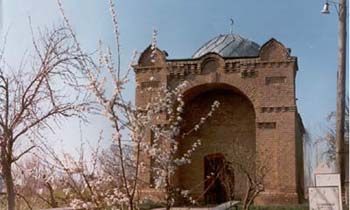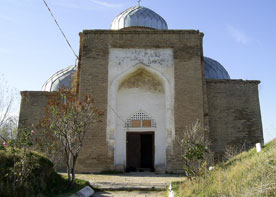Достопримечательности Сайрама
- Details
- Parent Category: Въездной туризм
- Published on Thursday, 04 February 2010 08:53
- Hits: 40451
Southern Kazakhstan, Sairam
 The village of Sairam is one of the oldest settlements on the territory of South Kazakhstan. Situated on the River Sairam-Su, 10 km east of Shymkent. In the early Middle Ages (IX-XII century), on the site of the city was Ispidzhab Sairam - tsentrodnoimennogo District, which was part of Maurya. It was part of the county as well Shymkent. The first mention of Ispidjab appears in the geographical work Chinese author Jiang Xuan in 629. With the XIII century, the city is known as Sairam. Title Sairam first found in the description of the Chinese travel hermit Chan Chun in the rate of Genghis Khan in 1221. Sairam - "City of the White River." In the Russian historical documents mention Sairam appears at the end of the XVII century. Development and formation of Sairam was due not only to favorable economic and geographical, but also a political position. On the caravan route from Shash (Tashkent) in Shymkent, as well as an outpost of the spread of Islam in the surrounding prairies. The historic center of Sairam in modern planning structure kotorgo preserved the contours of the ancient shakhristan and Phillips schematic layout of streets, is a monument of city-building culture IX-XIX centuries. In the histories of the XI-X centuries Ispidzhab called class military fortress. For the independence and dignity of the Arabs was called Ispidzhab one of the best cities in the East, respectfully calling it the White City. The mighty fortress famous for its unique water supply. Thanks to the availability of water and food, the city could withstand a siege of several months. Many disasters befell Ispidzhab after devastating wars with Khorezm Shah Muhammad and Carakitaiy. Nothing is left of the beautiful gardens and fortifications but ruined walls of ruined trees and disappeared people. In the XV century, the city was revived under a new name Sairam and again was surrounded by fortress walls, dug a ditch. After the destruction of Dzhungarian invasion in 1684 Sairam no longer able to regain its greatness. And now about the past glory of the White City except that resemble swollen contours of the once powerful fortress walls and bastions, miraculously survived the minaret of a mosque destroyed Bazalak-ata (XII century), with a spiral staircase inside, yes poluobrushivshiysya dungeon entrance that leads to nowhere. The past Sairam resemble some religious buildings built after Zhungar ruin, but two mazar associated with the name of Khoja Ahmed Yasawi. In Ispidjab his parents were buried. After the erection of the magnificent tombs in Turkestan in honor of Khoja Ahmed Yasavi in Sairam were built shrines to his parents - Ibrahim Ata and Karashash analysis. Suyab and Balasagun. Suyab was the first capital formed in 581, the territory of the modern Seven Rivers West-Turk Empire and was the center of a busy trade. Here annually gathered at a big fair merchants of various countries, where they discussed their trading business, buying and selling goods. Suyab - the ancient capital of Semirechensk Turks, progenitors of the Kazakh ethnic group, and Balasagun - the first city where the Turks have taken up the Koran.
The village of Sairam is one of the oldest settlements on the territory of South Kazakhstan. Situated on the River Sairam-Su, 10 km east of Shymkent. In the early Middle Ages (IX-XII century), on the site of the city was Ispidzhab Sairam - tsentrodnoimennogo District, which was part of Maurya. It was part of the county as well Shymkent. The first mention of Ispidjab appears in the geographical work Chinese author Jiang Xuan in 629. With the XIII century, the city is known as Sairam. Title Sairam first found in the description of the Chinese travel hermit Chan Chun in the rate of Genghis Khan in 1221. Sairam - "City of the White River." In the Russian historical documents mention Sairam appears at the end of the XVII century. Development and formation of Sairam was due not only to favorable economic and geographical, but also a political position. On the caravan route from Shash (Tashkent) in Shymkent, as well as an outpost of the spread of Islam in the surrounding prairies. The historic center of Sairam in modern planning structure kotorgo preserved the contours of the ancient shakhristan and Phillips schematic layout of streets, is a monument of city-building culture IX-XIX centuries. In the histories of the XI-X centuries Ispidzhab called class military fortress. For the independence and dignity of the Arabs was called Ispidzhab one of the best cities in the East, respectfully calling it the White City. The mighty fortress famous for its unique water supply. Thanks to the availability of water and food, the city could withstand a siege of several months. Many disasters befell Ispidzhab after devastating wars with Khorezm Shah Muhammad and Carakitaiy. Nothing is left of the beautiful gardens and fortifications but ruined walls of ruined trees and disappeared people. In the XV century, the city was revived under a new name Sairam and again was surrounded by fortress walls, dug a ditch. After the destruction of Dzhungarian invasion in 1684 Sairam no longer able to regain its greatness. And now about the past glory of the White City except that resemble swollen contours of the once powerful fortress walls and bastions, miraculously survived the minaret of a mosque destroyed Bazalak-ata (XII century), with a spiral staircase inside, yes poluobrushivshiysya dungeon entrance that leads to nowhere. The past Sairam resemble some religious buildings built after Zhungar ruin, but two mazar associated with the name of Khoja Ahmed Yasawi. In Ispidjab his parents were buried. After the erection of the magnificent tombs in Turkestan in honor of Khoja Ahmed Yasavi in Sairam were built shrines to his parents - Ibrahim Ata and Karashash analysis. Suyab and Balasagun. Suyab was the first capital formed in 581, the territory of the modern Seven Rivers West-Turk Empire and was the center of a busy trade. Here annually gathered at a big fair merchants of various countries, where they discussed their trading business, buying and selling goods. Suyab - the ancient capital of Semirechensk Turks, progenitors of the Kazakh ethnic group, and Balasagun - the first city where the Turks have taken up the Koran.  Cities featured in many historical records, but the exact geographical location of cities is difficult to establish. Almost two millennia functioned Silk Road. Nothing could stop the steady advance of his caravan. World shaken by bloody wars and devastating epidemics. Appeared and disappeared entire peoples and nations. Even the Amu Darya changed its origins, and the Aral Sea - its shape, and only the great caravan route remained eternal and immutable.
Cities featured in many historical records, but the exact geographical location of cities is difficult to establish. Almost two millennia functioned Silk Road. Nothing could stop the steady advance of his caravan. World shaken by bloody wars and devastating epidemics. Appeared and disappeared entire peoples and nations. Even the Amu Darya changed its origins, and the Aral Sea - its shape, and only the great caravan route remained eternal and immutable.
Ladies and gentlemen, Season Travel Kz organizes a trip to the South Kazakhstan region with visits to ancient cities such as Turkestan and Sairam, Sauran, Otrar and introduce you to the historical and architectural monuments of the Great Silk Road.








